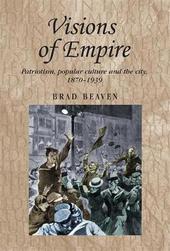
|
Visions of Empire: Patriotism, Popular Culture and the City, 1870-1939
Hardback
Main Details
| Title |
Visions of Empire: Patriotism, Popular Culture and the City, 1870-1939
|
| Authors and Contributors |
By (author) Brad Beaven
|
| Series | Studies in Imperialism |
|---|
| Physical Properties |
| Format:Hardback | | Pages:256 | | Dimensions(mm): Height 234,Width 156 |
|
| Category/Genre | British and Irish History
Colonialism and imperialism |
|---|
| ISBN/Barcode |
9780719078569
|
| Classifications | Dewey:941.081 |
|---|
| Audience | | Postgraduate, Research & Scholarly | |
|---|
| Illustrations |
Illustrations, black & white
|
|
Publishing Details |
| Publisher |
Manchester University Press
|
| Imprint |
Manchester University Press
|
| Publication Date |
1 November 2012 |
| Publication Country |
United Kingdom
|
Description
The emergence of a vibrant imperial culture in British society from the 1890s both fascinated and appalled contemporaries. It has also consistently provoked controversy among historians. This book offers a ground-breaking perspective on how imperial culture was disseminated. It identifies the important synergies that grew between a new civic culture and the wider imperial project. Beaven shows that the ebb and flow of imperial enthusiasm was shaped through a fusion of local patriotism and a broader imperial identity. Imperial culture was neither generic nor unimportant but was instead multi-layered and recast to capture the concerns of a locality. The book draws on a rich seam of primary sources from three representative English cities. These case studies are considered against an extensive analysis of seminal and current historiography. This renders the book invaluable to those interested in the fields of imperialism, social and cultural history, popular culture, historical geography and urban history. -- .
Author Biography
Brad Beaven is Principal Lecturer in History at the University of Portsmouth -- .
ReviewsVisions of Empire is a welcome addition to the debate about British cultural imperialism. With the advent of 'the global', paying heed to 'the local' can add much to historical understanding. A new history of empire is developing which highlights the ambiguity and elasticity of popular imperialism. Beaven's work advances this and presents a serious challenge to recent national and transnational studies of the cultural dispersal of imperial ideas. -- .
|